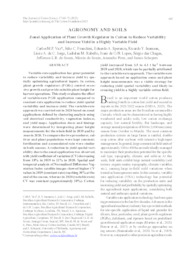Zonal application of plant growth regulator in cotton to reduce variability and increase yield in a highly variable field.
Zonal application of plant growth regulator in cotton to reduce variability and increase yield in a highly variable field.
Author(s): VAZ, C. M. P.; FRANCHINI, J. C.; SPERANZA, E. A.; INAMASU, R. Y.; JORGE, L. A. de C.; RABELLO, L. M.; LOPES, I. de O. N.; CHAGAS, S. das; SOUZA, J. L. R. de; SOUZA, M. de; PIRES, A.; SCHEPERS, J.
Summary: Variable-rate application has great potential to reduce variability and increase yield by spatially optimizing agricultural inputs. In cotton, plant growth regulators (PGRs) control excessive growth and provide suitable plant height for harvest operations. This study evaluates the effectof variable-rate PGR application compared toconstant-rate application to reduce yield spatialvariability and increase yield. The variable-rate approach was carried out in 2020 based on zonalapplications defined by clustering analysis using soil electrical conductivity, vegetation indexes,and yield maps. Application doses and timingswere determined by integrating plant heightmeasurements for the whole field in 2019 and byzone in 2020. To compare the two procedures, cultivar and plant populations were kept constant;fertilization and accumulated rain were similarin both seasons. A reduction in yield spatial variability due to the zonal application was observed,with yield coefficient of variation (CV) decreasing from 18% in 2019 to 12% in 2020. Spatial andtemporal analysis of Normalized Difference Veg-etation Index satellite images showed higher CVvalues in 2019 (constant-rate) reaching 30% at theend of the season, whereas in 2020 (variable-rate)CV was constant (approximately 10%). Cotton
Publication year: 2023
Types of publication: Journal article
Unit: Embrapa Instrumentation
Keywords: Agricultura, Agriculture, Algodão, Cotton, Crescimento de planta, Imagem de satélite, NDVI Temporal Series, Normalized difference vegetation index, Plant growth, Plant growth control, Plant growth regulator, Reguladores de crescimento de planta, Satellite images, Spatial variability, Séries temporais de NDVI, Variabilidade espacial, Variability, Variable rate application, Yields
Observation
Some of Embrapa's publications are published as ePub files. To read them, use or download one of the following free software options to your computer or mobile device. Android: Google Play Books; IOS: iBooks; Windows and Linux: Calibre.
Access other publications
Access the Agricultural Research Database (BDPA) to consult Embrapa's full library collection and records.
Visit Embrapa Bookstore to purchase books and other publications sold by Embrapa.

